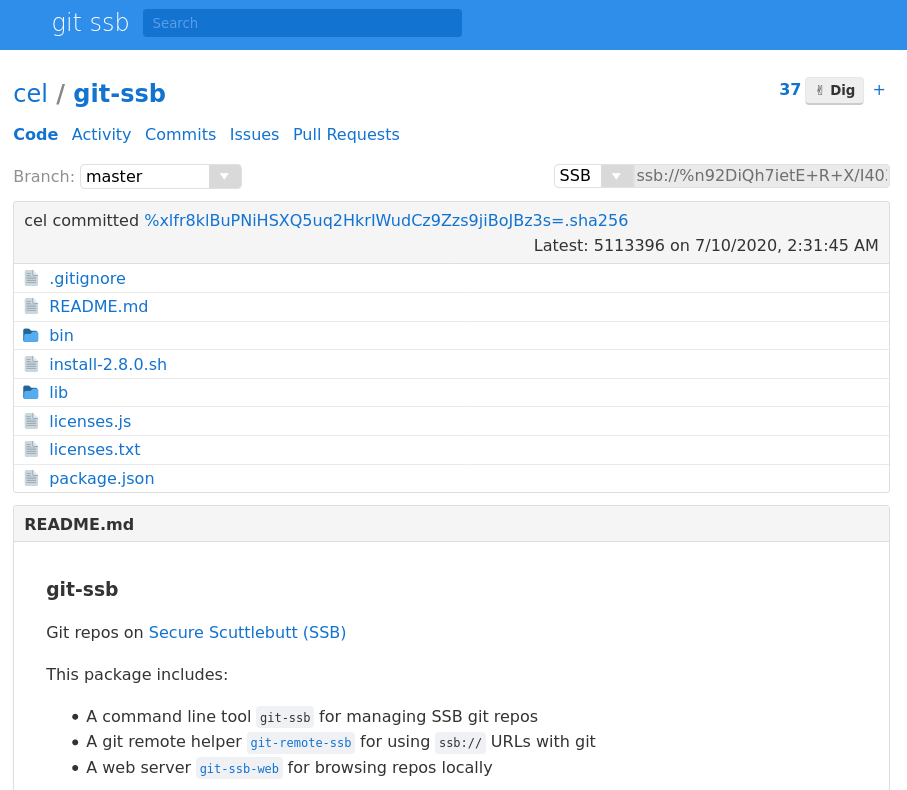SSB ( Secure Scuttlebutt ) is a decentralized social network and the protocol it operates on. git-ssb wraps regular git repositories with this protocol. SSB wants to replace Facebook, and git-ssb wants to replace GitHub. Under the cut - a quick guide to git-ssb. Relevant for those who are uncomfortable with the very idea of using centralized services as an intermediary. A kind of red pill with unexpected consequences in this case.
Secure scuttlebutt
The SSB protocol describes the rules for synchronizing your data between the nodes of the network interested in it. Your data is a history of your actions on the network, a linked list of json objects. The connection is set by the hash-sum of the previous object (as in the blockchain). Thus, once published, objects are immutable and non-removable. You can only add to the end of the list. A typical use case assumes that each item in the list is a blog post or comment. Pictures and other heavy objects are stored out of the list in the form of blobs and replicated separately. Objects in the list can refer to them.
Most of the netizens blog on the Patchwork and Manyverse apps . There are about a dozen blogging applications, they are mostly compatible with each other and differ in interface. In addition, there is chess, chat, package manager (ssb-npm) and git (git-ssb) . Some SSB developers use git-ssb as their main source control service. We will try too.
Install ssb-server and git-ssb
ssb-server is needed to synchronize with other nodes in the p2p network. It should be run when you push, pull, fetch, create a pull request, or fork a repository.
The git-ssb package includes:
program for managing repositories (git-ssb)
git-remote-helper , which understands addresses starting with ssb: //
web-, GitHub
ssb-server.
$ sudo apt install git nodejs npm
$ npm install ssb-server git-ssb
ssb-server git-ssb $HOME/node_modules
. , ~/.profile
:
if [ -d "$HOME/node_modules/.bin/" ] ; then
PATH="$HOME/node_modules/.bin/:$PATH"
fi
$PATH
,
$ source ~/.profile
~/.profile
. (, Xfce) . $PATH
, .xsessionrc
~/.profile
:
. ~/.profile
ssb-server .
$ ssb-server start
identity ~/.ssb
.
, . , , . . , .
. , . . , .
$ ssb-server invite.accept <-->
: , - .
@cel
@cel - git-ssb.
$ ssb-server publish --type contact --contact "@f/6sQ6d2CMxRUhLpspgGIulDxDCwYD7DzFzPNr7u5AU=.ed25519" --following
~/.ssb
1Gb - ( git-) , . , .
. :
web-
$ git-ssb-web
, issue . , , , , . activity log, - , GitHub.

web- (, , issue ) . , : , issue ... ssb-server ( ) .
$ mkdir my-new-repo
$ cd my-new-repo
$ git init
Initialized empty Git repository in /tmp/my-new-repo/.git/
$ git-ssb create ssb my-new-repo
Created repo: ssb://<hash-code>.sha256 (my-new-repo)
Added remote: ssb
$ git remote -v
ssb ssb://<hash-code>.sha256 (fetch)
ssb ssb://<hash-code>.sha256 (push)
git init
git-ssb create ssb my-new-repo
, my-new-repo
URL remote ssb
. remote .
ssb remote . .
: - SSB. .
$ git push ssb master
, . git-ssb pack- blob, 5Mb. . , , :
$ git push ssb master -o allow-big
(blob ), pack- , blob.
pack- - , git- pack- 5Mb.
git-ssb git-ssb. SSB DNS . ssb://%n92DiQh7ietE+R+X/I403LQoyf2DtR3WQfCkDKlheQU=.sha256
web-.
$ git clone ssb://%n92DiQh7ietE+R+X/I403LQoyf2DtR3WQfCkDKlheQU=.sha256 git-ssb
$ cd git-ssb
$ git remote -v
origin ssb://%n92DiQh7ietE+R+X/I403LQoyf2DtR3WQfCkDKlheQU=.sha256 (fetch)
origin ssb://%n92DiQh7ietE+R+X/I403LQoyf2DtR3WQfCkDKlheQU=.sha256 (push)
remote, SSB.
$ git-ssb fork my-fork
Created repo: ssb://<new-hash-code>.sha256 (git-ssb)
Added remote: my-fork
$ git remote -v
my-fork ssb://<new-hash-code>.sha256 (fetch)
my-fork ssb://<new-hash-code>.sha256 (push)
origin ssb://%n92DiQh7ietE+R+X/I403LQoyf2DtR3WQfCkDKlheQU=.sha256 (fetch)
origin ssb://%n92DiQh7ietE+R+X/I403LQoyf2DtR3WQfCkDKlheQU=.sha256 (push)
, remote.
-
.
$ git-ssb pull-request
, . , .
, . (git-ssb-intro), . @-/master
(git checkout -b @-/master
), (git push ssb
), - (git ssb pull-request
). master -.
, identity ( identity - . ) . git-ssb , . . identity, , . , , . , - , .
Identity ~/.$ssb_appname/secret
. ssb_appname
, identity (~/.ssb
). secret
, ssb-server .
permissionless , , identity.
, : - , , sudo make install
. , - . , , git pull
. , .
SSB.
?
git-ssb-intro: a guide to hacking together on the distributed web
git:
GitTorrent ( BitTorrent)
HyperGit ( Dat)
igis-remote ( IPFS)
ipld-remote ( IPFS)
GitCenter ( ZeroNet)
Mango (Ethereum + IPFS)
Radicle
Gitopia
The first four are analyzed in detail in Daniel Aleksandersen's article " Four P2P distribution tools for Git repositories compared ". There are comments from the SSB developers to it.
Thanks for attention. Hope it wasn't too boring. Good decentralization to those who care.
The picture in the header was generated using the myoctocat.com service .